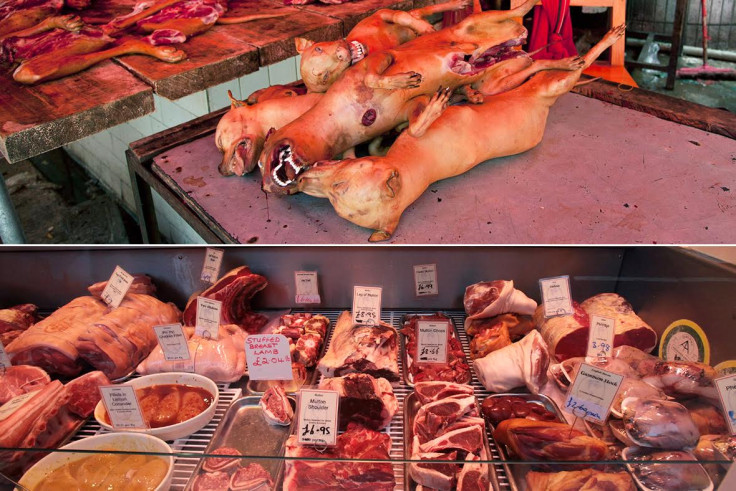The meat paradox: Why we love animals but slaughter and eat them

It is always difficult to change people's routines, and nowhere is this more plain to see than with food choices. For the most part, people don't think much about what they eat; they know what they like and they stick with it. That's not to say that a person won't spend time perusing a menu before ordering. But people rarely think about the ethical implication of what they eat: how their choices might promote a wider concern for the planet and the animals that populate it.
Particularly where meat is concerned, little thought is given to issues that extend beyond taste, health or wallet. While there is growing concern for how our food choices impact upon the greater world, and a steady stream of books educating us on the subject, there is not a single country in which vegetarians and vegans comprise the majority of the population. Quite the contrary, worldwide veggies range from roughly 1% (in the Czech Republic) to 40% (India), with most countries falling towards the lower end (2-3% estimated in the UK).
Given that we live in a world that has become increasingly sensitive to the injustices we perpetrate toward minorities of our own species, what is keeping us from seeing a comparable rise in concern for the ethical treatment of other species, particularly those we use as food and consumer products? In short, what explains the low uptake of a vegetarian or vegan diet?
A number of psychologists, including myself, have begun to ask this question, and have reached a few conclusions.
Believing there isn't an issue
There is no doubt that people care about animals. Yet many people do not seem all that bothered by eating them. Steve Loughnan and his colleagues refer to this as the 'meat paradox' – people love animals, and love eating them. Unless you are Armin Meiwes, the Rotenburg Cannibal, and enjoy eating your friends, this is plainly a contradiction. But somehow we're content with the logic of it when applied to animals.
One way out of the meat paradox is to restrict your moral concern to certain animals, such as cats and dogs. Many people do this (we call it 'dichotomising') despite the arbitrariness of it. Many of the animals we eat (cows, pigs, sheep) are just as intelligent as dogs and cats, if not more intelligent on some measures, so caring about dogs but not pigs is arbitrary. It is based purely on prejudice for dogs. We don't find prejudice and arbitrariness morally credible when applied to people, but we're content to apply it to animals.
We don't find prejudice and arbitrariness morally credible when applied to people, but we're content to apply it to animals
Another way out is to ignore relevant information. Steve Loughnan and I found that people tend to think that animal intelligence matters when we decide how to treat animals. That is, we think smart animals deserve greater protection. However, this was only the case when the animal is not being used as meat, and thus does not present an ethical dilemma for people.
For example, in one study British participants learned that tapirs were used as meat in South America. Participants who further learned that tapirs were smart were more likely to condemn this practice than participants who learned they were dumb. But when the animal was switched to a pig, participants were supportive of the practice, even when they learned how smart pigs are. This process is reflected in the inconsistent way in which we as Westerners ignore the intelligence of pigs, sheep, and cows, while erupting with outrage over Japanese whaling and the Yulin dog-meat festival.
Humans still like to view themselves as special, unmatched in the animal kingdom in intelligence and cultural achievement
Yet another way out is to deny that we have any responsibility or choice in the matter—that abstaining from meat won't change anything or that it is impossible to eat ethically given the state of the world. Indeed, psychologist Hank Rothgerber found that meat eaters were more candid about their meat eating after having learned that a vegetarian failed to maintain their vegetarian lifestyle, thus, letting them off the hook for their own behaviour.
What works then?
One way to get people to think more compassionately about their food choices is to have people confront their own rationalisations for not making a change. With regards to meat, this involves confronting the '4Ns': that it is 'necessary', 'normal', 'natural' and 'nice' to eat meat' – or, more concretely, that it is necessary to eat meat to be healthy, that it is the normal way of doing things, that we are naturally carnivores, or that bacon tastes too good to care about pigs.
While the 4Ns are widely endorsed, they are not indelible. Indeed, we used to think it was necessary, normal, natural and nice to let men vote and not women. Yet, now that our values have changed, we no longer find such arguments compelling.
Another mechanism may be to close the divide that we think exists between humans and animals. Despite what we've learned from Darwin, humans still like to view themselves as special, unmatched in the animal kingdom in intelligence and cultural achievement. Research by Brock Bastian and colleagues shows that getting people to think about animals as more 'human-like' – that is, sharing traits we tend to think as uniquely human – helps close the human-animal divide and increases our concern for them.
Thus, by confronting our outmoded rationalisations, building connections with animals and expanding our scope of moral concern, we might begin to think more compassionately about our food choices and the animals they affect.
Dr Jared Piazza is a Lecturer in Social Psychology at Lancaster University.
© Copyright IBTimes 2025. All rights reserved.




















